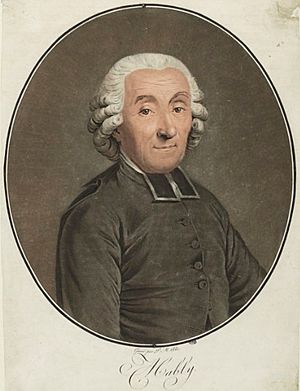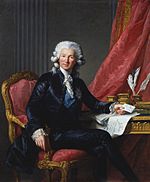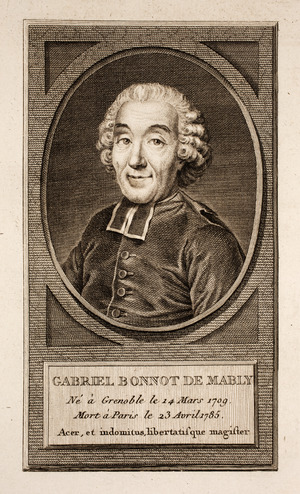Gabriel Bonnot de Mably facts for kids
Quick facts for kids
Gabriel Bonnot de Mably
|
|
|---|---|

Gabriel Bonnot de Mably,
Musée de la Révolution française. |
|
| Born | March 14, 1709 |
| Died | April 2, 1785 (aged 76) |
| Nationality | French |
Gabriel Bonnot de Mably (born in Grenoble, France, on March 14, 1709 – died in Paris on April 2, 1785), sometimes known as Abbé de Mably, was a French philosopher, historian, and writer. For a short time, he worked in diplomacy. He was a popular writer in the 1700s.
About Gabriel Bonnot de Mably
Early Life and Family Background
Gabriel Bonnot was born in Mably, France. His family was part of the Noblesse de robe. This was a group of nobles who earned their status through important jobs like judges or government officials. They were often very hard-working. This was different from other nobles who inherited their titles.
Gabriel and his older brother Jean added "de Mably" to their names. His younger brother, Étienne, also became a famous writer and thinker, known as 'Condillac'.
Education and Diplomatic Work
Gabriel and his brothers were educated by the Society of Jesus, also known as the Jesuits. Gabriel later went to a seminary in Saint-Sulpice, which is a school for training priests.
In 1742, he became a close advisor to Cardinal Tencin. The Cardinal was a powerful government minister. Gabriel de Mably took on various diplomatic roles for him. This was during a big European conflict called the War of the Austrian Succession (1740-1748).
Key Diplomatic Missions
- In 1743, he helped negotiate an alliance with Prussia.
- In 1746, he helped prepare for the Congress of Breda. This meeting aimed to make a separate peace agreement with Britain.
However, he later had a disagreement with Cardinal Tencin. After that, he decided to focus more on his studies and writing.
Friendship with Jean-Jacques Rousseau
In 1740, Gabriel's older brother, Jean, hired a 28-year-old man named Jean-Jacques Rousseau to teach his two oldest sons. Rousseau was a famous philosopher.
Rousseau wrote two short pieces for Jean de Mably about how to educate his sons. These writings showed some of Rousseau's early ideas about education and his own thoughts. By 1741, Rousseau realized that teaching was not the right job for him. He and Jean de Mably ended their agreement on good terms.
The historian Leo Damrosch explained that Gabriel de Mably had just published a book. This book compared the governments of ancient Rome and France. It also celebrated how civilization was progressing. Talking with Mably, Condillac, and other friends helped Rousseau's studies come alive.
Rousseau remained lifelong friends with Mably and his family. Both Mably and his brother Condillac visited Rousseau later in his life. Rousseau also wrote about his time teaching Jean de Mably's sons in his famous book, The Confessions.
Mably's Impact and Ideas
In 1909, a thinker named Peter Kropotkin praised Mably for several important things:
- Mably made the study of politics, governments, and elected representatives very popular in the 1700s.
- He inspired ideas of equality and community that were important during the French Revolution.
- He was one of the first people to suggest that land should be owned by everyone, not just individuals. This idea is similar to communism.
Key Philosophical Concepts
Mably's writings helped shape later ideas about both communism and republicanism. He believed that private property (owning things just for yourself) was not good. He thought it made people selfish instead of kind and helpful.
Mably's ideas had an interesting mix. He admired elitist Plato, a Greek philosopher. But he also liked the Stoic idea that all humans are naturally equal. Mably went further than the Stoics. He argued that everyone should have their basic needs met, not just be equal under the law.
He believed that being a good person (having virtue) was more important than having a lot of money or possessions. He also criticized people who were lazy and lived off inherited wealth. His ideas were popular among those who disliked the rich and privileged nobility who did not work.
Mably's Writings
Mably's most famous work is Entretiens de Phocion. This book was first published in 1763. It was written as a dialogue (a conversation between characters). It introduced many of his main ideas.
Two of his books were published after he died. These books had a big impact on the discussions leading up to the Estates-General of 1789, which was a major event before the French Revolution.
- An expanded version of his Histoire de France (first published in 1765) came out in May 1789. It was very popular. Authorities tried to stop it from being read, but they failed.
- His book Des droits et des devoirs du citoyen (On the Rights and Duties of the Citizen), written in 1758, was also published after his death. In this book, he warned about events that later happened during the French Revolution.
Mably's complete works were published in 15 volumes between 1794 and 1795.
Selected Works by Gabriel Bonnot de Mably
- Parallèle des Romains et des François par rapport au governement (1740) - Compared Roman and French governments.
- Le droit public de l'Europe fondé sur les traités conclus jusqu'en l'année 1740 (1746) - About public law in Europe based on treaties.
- Observations sur les Romains (1751) - Observations on the Romans.
- Entretiens de Phocion (1763) - Conversations of Phocion, his most famous work.
- Observations sur l'histoire de France (1765) - Observations on the history of France.
- Doutes proposées aux philosophes économistes sur l' Ordre naturel et essentiel des sociétés politiques (1768) - Doubts about the natural order of political societies.
- De la législation, ou Principes des lois (1776) - About lawmaking and principles of laws.
- De la manière d'écrire l'histoire (1783) - On how to write history.
- Principes de morale (1784) - Principles of morality.
- Observations sur le gouvernement et les lois des États-Unis d'Amérique (1784) - Observations on the government and laws of the United States.
Works Published After His Death
- Observations sur l'histoire de France, new edition (1788)
- Des droits et des devoirs du citoyen (1789; written in 1758) - On the Rights and Duties of the Citizen.
Recent English Translations
- Concerning the Rights & Duties of the Citizen – Translated by Simon de Vries (2008)
- Letters to Madame the Marchioness of P **** on the Opera – Translated by Simon de Vries (2010)
See also
 In Spanish: Gabriel Bonnot de Mably para niños
In Spanish: Gabriel Bonnot de Mably para niños
 | Emma Amos |
 | Edward Mitchell Bannister |
 | Larry D. Alexander |
 | Ernie Barnes |



